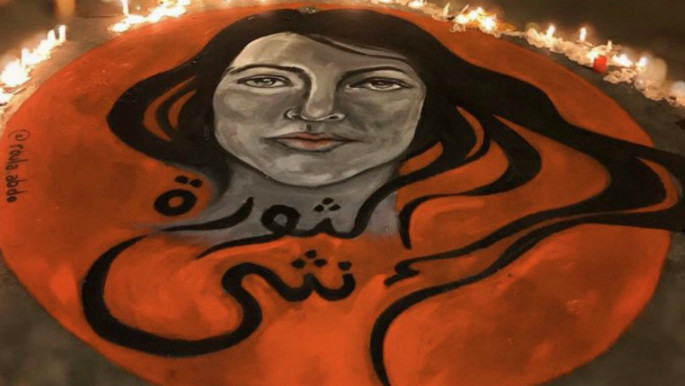No longer silent: Why Lebanese women took to the streets against sexual violence
It all started with a feminist flash mob that went viral last month, when Chilean women danced in protest against a violent government crackdown on anti-government protests.
The women performed to Un Violador En Tu Camino (A Rapist in your Path) – a song which calls for an end to the heinous crimes that females are subjected to.
This resonated with women worldwide and eventually led to the congregation of Lebanese women on Saturday.
"We wanted to join hands with women all over the world, to have one voice, one cause: defend ourselves against any sort of gender-based violation. No matter your origin, race, or beliefs are, as women we are facing the same discrimination and violence," said Aya Joumaa, one of the main organisers of the march.
 |
No matter your origin, race, or beliefs are, as women we are facing the same discrimination and violence |  |
"We want to say to our government that we won't be silent anymore."
 |
|
| Read also: The revolution is female': Why feminist issues are driving Lebanon's protests |
The women who took part in the flashmob translated the originally Spanish lyrics into Arabic. They adapted the lyrics to highlight their own experience of sexual violence in Lebanon, speaking on issues such as child custody which is often discriminately granted to men.
These are the same women who have been leading the anti-government protests dominating Lebanon for over two months. Their efforts to campaign for the resignation of the corrupt political system is intrinsically linked to their rejection of the patriarchy, which they see in many aspects of Lebanon's institutions.
"In Lebanon, we have a big problem where women are restricted legally through the laws of the government controlled by religious institutions. So one of the biggest demands of the revolution is to have a civil state as it gives us a chance to establish equal rights for women within the state's institutional," said Rose, another woman partaking in the march on Saturday.
Read more: Why feminist issues are driving Lebanon's protests
Protest organiser, Lea Freiha, led the large group of women through dance moves symbolising the hardships women face day-to-day, often which are not spoken about.
"For the first time in the history of Lebanon we are shining a light on everything that is corrupted. All those years we felt ashamed and scared of speaking out – worried whether they would believe us or not – this is all part of the corruption that is commonplace in Lebanon," she said.
 |
For the first time in the history of Lebanon we are shining a light on everything that is corrupted |  |
As many as one in four women in Lebanon have suffered instances of sexual harassment, a new study by Princeton University revealed this month.
Alia Awada, spokesperson for Abaad, a Lebanese non-governmental organisation that promotes gender equality, says that the problem of sexual harassment in Lebanon is perpetrated by social customs as well as legal institutions.
Twitter Post
|
"On the social level, Lebanese society's behaviours and perceptions of everything that has to do with women, especially their honour and their bodies leads to harassment because it is perceived to be ok to judge women's bodies. The bodies of women are never their own – they always belong to society," Alia says.
"There is also no law against sexual harassment in Lebanon, and a few years ago when one of the MPs submitted a law to parliament, the reaction was a wave of laughter from parliamentarians saying he was trying to sanction the giving of compliments to women. The bill didn't pass," she added.
"The new minister of women's affairs was working on a new law with women's groups to tackle this, but it was before the revolution so I don't know how it will progress."
The penal code in Lebanon has very small sentences for crimes related to sexual violence, including rape, and kidnapping. So perpetrators are not significantly discouraged from carrying out these crimes.
Alia said there was a case months ago of a father who raped three of his daughters, leaving one pregnant. He received a mere seven year jail sentence.
 |
This legal system is not acceptable. That's why we need to raise awareness around sexual violence in Lebanon – this is why we marched on Saturday |  |
For this reason, the protesters do not want this bill, and do not want women's rights to be forgotten during this time of sweeping change.
"This legal system is not acceptable. That's why we need to raise awareness around sexual violence in Lebanon – this is why we marched on Saturday," she added.
Most recently, dozens of women provided testimonies online against Marwan Habib, a personal trainer, who allegedly harassed them multiple times face-to-face and via social media. Lawyer Kareem Majbour filed a lawsuit against Habib soon after the allegations were made starting from November 22. Habib recently denied the allegations on a local TV station.
The Habib allegations have played a part in fuelling the anger of Lebanese women towards the issue of sexual violence in the country, and the online declarations have ushered a unity like the one of the #MeToo movement against Hollywood producer Harvey Weinstein in 2017.
Read more: Lebanon's social media looks like the Wild West, and women journalists are in the crosshairs
"Before the revolution women were hesitant to speak out on such subjects because of the culture of blame: women are blamed for what they wear, say, or even how they walk. Now there is solidarity to speak up collectively against this in a safe way," Alia said.
"Because of the revolution, women from different social, cultural, and religious backgrounds joined together to demand protection for each other."
Gaia Caramazza is a journalist at The New Arab. Follow her on Twitter @GaiaCaramazza



